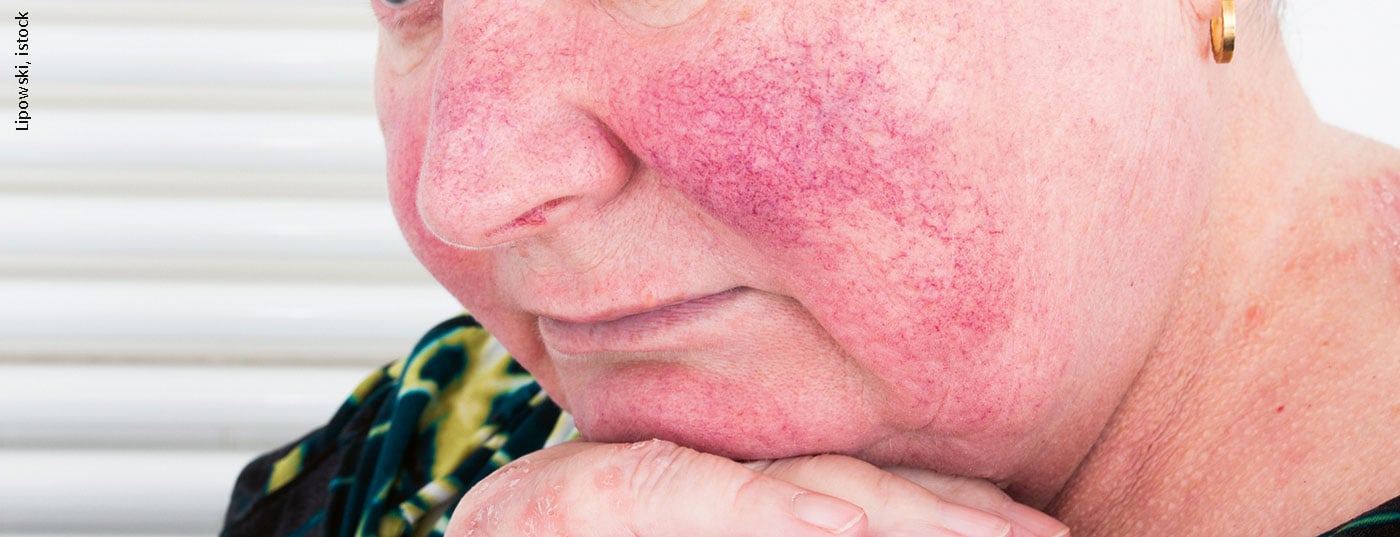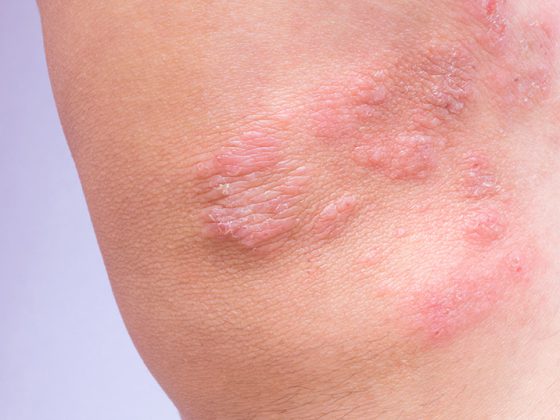Rosacea can have a significant impact on the psychological well-being of sufferers. “Awareness” of the psychological dimension of this dermatosis and of the multiple treatment options is important to improve the care of rosacea patients. This was the starting point for a questionnaire study by a British research team.
The often highly visible skin changes represent a cosmetic disfigurement for patients, which has a negative impact on their self-esteem and can lead to rumination [1]. Social stigma and negative self-perception contribute to psychosocial stress. This can result in depression and anxiety [2]. Dissatisfaction and annoyance/embarrassment related to the appearance of their face often leads to social isolation [3]. This, in turn, has a detrimental effect on the patients’ quality of life, as it results in social exclusion and further worsens psychological well-being. On the other hand, psychosocial stress caused by rosacea is a trigger factor for rosacea attacks, which can lead to a vicious cycle [4].
Women are particularly affected by stigmatization
In a UK study of 60,042 patients published in 2021, 61.5% of study participants were female [4]. From further studies, the impairment in quality of life caused by rosacea is higher in females than in males [4]. Despite the higher prevalence of rosacea in women, there have been few studies on the psychosocial impact of this dermatosis in this patient subpopulation. Increased awareness of rosacea treatment options could reduce the negative psychological effects. With this in mind, a British research group conducted an empirical study focusing on psychosocial effects of rosacea in female patients [6].
Questionnaire Study: RosaQoL and Rosenberg Self Esteem Scale
The RosaQoL is a questionnaire with 21 items. The impact of rosacea on quality of life will be assessed with a focus on emotional well-being, symptom expression and impairment in daily life. The response format corresponds to a 5-point Likert scale (1=never, 5=always). Furthermore, an adapted version of the Rosenberg Self Esteem Scale (RSES) was used. Self-esteem and self-perception are assessed by means of 10 items. The response format is a 4-point Likert scale (strongly disagree, disagree, agree, strongly agree).
A total of 19 female patients participated in the survey, 13 of whom were in the 41-50 age group, 5 were 51-60 years old, and one patient was over 61 years old. Study participation was voluntary. All subjects had been suffering from rosacea for at least 5 years and were receiving treatment as outpatients at New Cross Hospital, Wolverhampton (UK), from January to June 2019.
Conclusion: high psychological suffering pressure
Data analysis shows that over half of the participants (53%) reported suffering from feelings of frustration “all the time” due to rosacea, and about one-third (32%) felt frustrated “often.” Annoyance/embarrassment due to skin appearance was felt “all the time” by a proportion of 37% of study participants, and “often” by as many. It is noteworthy that none of the subjects answered this with “rarely” or “never.”
The findings of the present study provide further evidence of the significant psychosocial impact of rosacea, and this questionnaire study focused on the subpopulation of female patients. The researchers point out that further studies with larger samples should be conducted to find out more about the psychosocial impacts of rosacea, even independent of gender effects.
Literature:
- Heisig M, Reich A: Psychosocial aspects of rosacea with a focus on anxiety and depression. Clinical Cosmetic Investigation 2018; 11: 103-107.
- Oge LK, et al: Rosacea: Diagnosis and Treatment. American Family Physician 2015 ; 92: 187-196.
- Powell FC : Rosacea and the pilosebaceous follicle. Cutis 2004; 74: 9-12.
- Spoendlin J, et al: A study on the epidemiology of rosacea in the UK. Br J Dermatol 2021; 167: 598-605.
- Huynh TT : Burden of Disease: The Psychosocial Impact of Rosacea on a Patients Quality of Life. Am Health Drug Benefits 2013; 6: 348-354.
- Al Abadie M, Asharaff F, Al Abadie D: Psychosocial Impact of Rosacea on Women. J Dermatol Res Ther 2019; 5: 074. doi.org/10.23937/2469-5750/1510074.
DERMATOLOGY PRACTICE 2022; 32(2): 35











